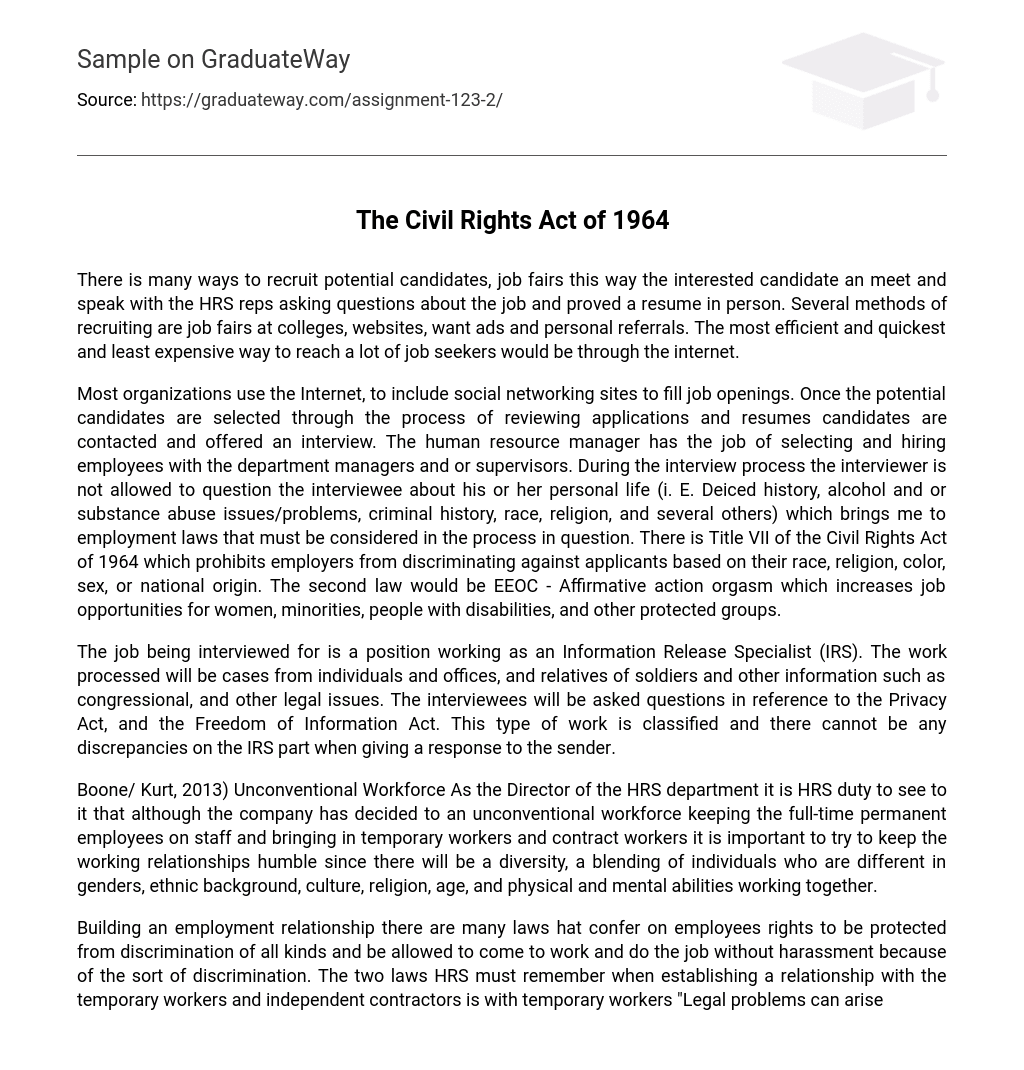There is many ways to recruit potential candidates, job fairs this way the interested candidate an meet and speak with the HRS reps asking questions about the job and proved a resume in person. Several methods of recruiting are job fairs at colleges, websites, want ads and personal referrals. The most efficient and quickest and least expensive way to reach a lot of job seekers would be through the internet.
Most organizations use the Internet, to include social networking sites to fill job openings. Once the potential candidates are selected through the process of reviewing applications and resumes candidates are contacted and offered an interview. The human resource manager has the job of selecting and hiring employees with the department managers and or supervisors. During the interview process the interviewer is not allowed to question the interviewee about his or her personal life (i. E. Deiced history, alcohol and or substance abuse issues/problems, criminal history, race, religion, and several others) which brings me to employment laws that must be considered in the process in question. There is Title VII of the Civil Rights Act of 1964 which prohibits employers from discriminating against applicants based on their race, religion, color, sex, or national origin. The second law would be EEOC – Affirmative action orgasm which increases job opportunities for women, minorities, people with disabilities, and other protected groups.
The job being interviewed for is a position working as an Information Release Specialist (IRS). The work processed will be cases from individuals and offices, and relatives of soldiers and other information such as congressional, and other legal issues. The interviewees will be asked questions in reference to the Privacy Act, and the Freedom of Information Act. This type of work is classified and there cannot be any discrepancies on the IRS part when giving a response to the sender.
Boone/ Kurt, 2013) Unconventional Workforce As the Director of the HRS department it is HRS duty to see to it that although the company has decided to an unconventional workforce keeping the full-time permanent employees on staff and bringing in temporary workers and contract workers it is important to try to keep the working relationships humble since there will be a diversity, a blending of individuals who are different in genders, ethnic background, culture, religion, age, and physical and mental abilities working together.
Building an employment relationship there are many laws hat confer on employees rights to be protected from discrimination of all kinds and be allowed to come to work and do the job without harassment because of the sort of discrimination. The two laws HRS must remember when establishing a relationship with the temporary workers and independent contractors is with temporary workers “Legal problems can arise when temp workers, particularly those kept on for long periods of time and doing the same work as regular employees, challenge their exclusion from the benefits available to a company’s regular employees. Under the Fair Labor Standards Act the independent contractors work for themselves. A company cannot establish independent contractor status simply by labeling its workers as contractors. Companies using independent contractors should have signed agreements spelling out the terms of these relationships. Clarifying the nature of relationships at the outset can avert misunderstandings. ” (Walsh, 2013). Knowing these laws and keeping in mind the status of the temporary workers and the independent contractors also knowing the law pertaining to their status will play a major role in the business relationship.
Organizations HRS policies and process The organizations HRS polices in promoting a diverse workforce is effective in a ay that diversity can be crucial for companies wanting to attract and retain good talent. The HRS is the major support behind a successful company because it is HRS who select, interview and hire the employees for the company with some assistance from the managing staff. Diversity is what makes an organization or company successful.
Have a diverse group of background experiences, perspectives, are crucial to development and crucial to encouraging different perspectives and births innovation. Affirmative Action Strategy “Cultural diversity can provide distinct competitive advantages in the world of mall business, and all business owners can benefit from employing proactive affirmative action strategies to build a culturally diverse workforce. Hiring culturally diverse employees is only the first step, however.
To fully leverage the benefits of cultural awareness in the workplace, companies must actively promote diversity awareness among all employees. Benefits Cultural awareness is achieved when all employees in a company can appreciate the benefits of cultural diversity. The numerous benefits of cultural diversity stem from the fact that people from different cultures bring different respective to the table, introducing new ideas, perspectives and personalities into strategic planning processes and workplace activities in general.
A culturally diverse and aware workforce can create a company culture of mutual respect and dignity, garnering a reputation as a fair employer in the job market. Company Leadership Seek out minority employees for leadership positions, but be careful not to overlook more qualified or better-performing candidates based solely on their majority status. Hiring culturally diverse employees can serve to spread cultural awareness among employees, but culturally diverse leaders can go even further o leverage their cultural uniqueness for the benefit of their work teams and employers.
Placing minorities in leadership positions can promote understanding between different cultures in the workplace and can encourage lower-level minority employees that there are career advancement opportunities for them within your company. Diversity Training Include diversity training as part of new-hire training programs or advanced training programs for managers. Diversity education programs can help employees to recognize prejudices and cultural assumptions in their own minds, while teaching them skills to respectfully seek to understand other cultures hey come in contact with.





